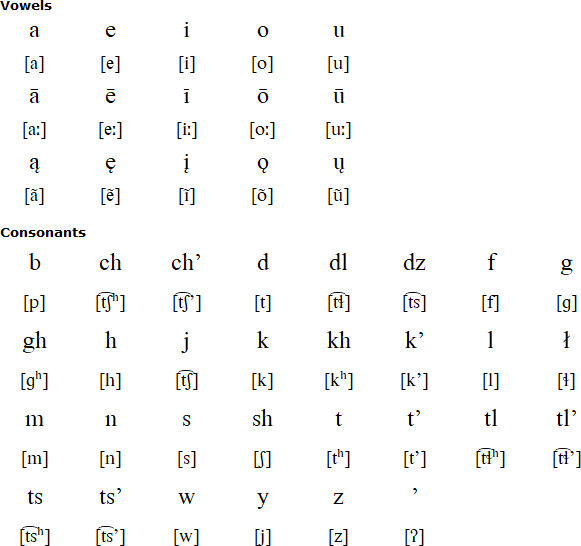Kaska is a Northern Athabaskan language spoken in the Kaska Dene region of Canada, mainly in Ross River and Watson lake in southeastern Yukon, and in Lower Post, Fireside, Good Hope Lake, Dease Lake and Muncho Lake in northern British Columbia. There are also Kaska speakers in Fort Ware in the southwest of the Northwest Territories. According to the 2016 census, there were 240 native speakers of Kaska, and another 150 people who have some knowledge of it.
Kaska is also known as Caska, Eastern Nahane, Kaska Dena, Nahane or Nahani. It is closely related to Tahltan and Sekani.
Kaska language learning resources and classes are supported by the First Nations Endangered Languages Program at the University of British Columbia, and the Kaska First Nations. There are Kaska classes in schools in Watson Lake, Ross River, Lower Post and Good Hope Lake.

Kaska has four tones: the high tone is indicated with an acute accent (á), the falling tone with a circumflex (â), and the rising tone with a caron (ǎ). These accents can be combined with the accents that indicate vowel length - the macron (ā), and nasalization - the ogonek (ą). For example, ṓ is a long o with a high tone, ū̂ is a long u with a falling tone, and ę̄̌ is a long nasalized e with a rising tone.
Download an alphabet chart for Kaska (Excel)
Gūchōʼ kḗgedīʼ, sekʼādé gūkʼéh gū́sʼānī lā. Nahtsʼédānéʼ gutie gukʼéh kegiyehdį̄ wḗdé gūchōʼ gekʼéh gūʼą̄ī degā. Dūłą̄́ gukēyeh ā́ndzedeʼą̄́. Nahdegā lā sugudzeneʼīnī. Gutīe nahhwanī kʼī gūzā́gī, gūkēyeh gukʼéh gū́sʼānī dega gūtīe sunehʼīn. Dene tsʼį̄́ gūdehdéh déʼ, “Nahtsʼédānéʼ tsʼį̄́ Dene kʼéh gūdehdéh,” gedīʼ tsʼédāne dḗngētsedle déʼ, gūtie denezāgī kūgūhdį́ sį̄́ ekūdeh. Wḗdé Nahtsʼédānéʼ tsʼį̄́ʼ gūdehdéh. Tsʼédāne neyehī dūłą̄́ guzāg-I kʼéh denekʼéh gūsʼāni meyḗgūdī sį̄́. Eghąh edegedezets.
Our elders say, We still keep our ways. Teach your children well in our ways so our elder’s ways will carry on. Don’t give away our land. It is for you that we are keeping it. You all also keep our language, our land and our ways. Tell our people to teach their children to speak our language. It is better to teach your children while they are small. Speak to your children all the time in Kaska. We are worried that the children are going to grow up without knowing their language and without knowing their ways.
Source: https://www.firstvoices.com/explore/FV/sections/Data/Athabascan/Kaska/Denek’éh_Kaska/learn
Information about Kaska | Numbers
Information about the Kaska language and culture
https://en.wikipedia.org/wiki/Kaska_language
https://fr.wikipedia.org/wiki/Kaska
https://kaskadenacouncil.com/our-language/
https://kaska.arts.ubc.ca/
http://www.ynlc.ca/kaska.shtml
http://www.native-languages.org/kaska.htm
https://www.ethnologue.com/language/kkz
http://www.endangeredlanguages.com/lang/2296
https://kaskadictionary.wordpress.com/
Ahtna, Apache (Western), Babine-Witsuwit'en, Chilcotin, Chipewyan, Deg Xinag, Dena’ina, Dane-zaa (Beaver), Eyak, Gwich'in, Hän, Hupa, Jicarilla, Kaska, Koyukon, Lipan Apache, Lower Tanana, Mescalero-Chiricahua, Navajo, North Slavey, Sekani, South Slavey, Tahltan, Tanacross, Tłı̨chǫ (Dogrib), Tolowa, Tsuut'ina (Sarcee), Tutchone, Upper Kuskokwim, Upper Tanana
Languages written with the Latin alphabet
Page last modified: 20.04.23
[top]
You can support this site by Buying Me A Coffee, and if you like what you see on this page, you can use the buttons below to share it with people you know.

If you like this site and find it useful, you can support it by making a donation via PayPal or Patreon, or by contributing in other ways. Omniglot is how I make my living.
Note: all links on this site to Amazon.com, Amazon.co.uk
and Amazon.fr
are affiliate links. This means I earn a commission if you click on any of them and buy something. So by clicking on these links you can help to support this site.
[top]